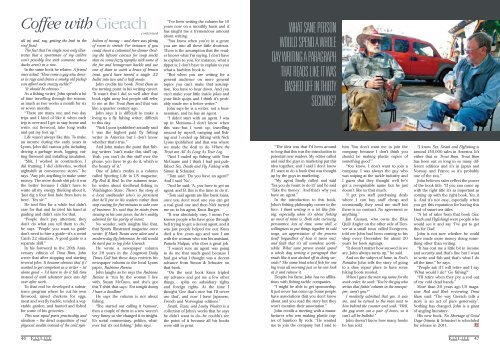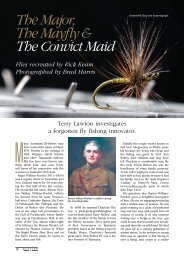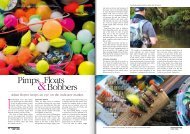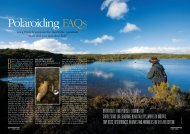coffee with gierach
coffee with gierach
coffee with gierach
- No tags were found...
Create successful ePaper yourself
Turn your PDF publications into a flip-book with our unique Google optimized e-Paper software.
Coffee <strong>with</strong> Gierach. . . continuedall in) and, say, getting the leak in theroof fixed.The fact that I’m single now only illustratesthat a sportsman of my calibrecan’t possibly live <strong>with</strong> someone whoseducks aren’t in a row.In the same book he relates: A friendonce asked, “How come a guy who dressesin rags and drives a smoky old pickupcan afford such snazzy tackle?”“It should be obvious.”As a fishing writer, John spends a lotof time travelling through the season;as much as two weeks a month for sixor seven months.“There are many one and two daytrips and I kind of like it when eachtrip is over and I get to stay home andwrite, cut firewood, take long walksand put my feet up.”Life wasn’t always like this. To makean income during the early years inLyons, John did various jobs includingdriving a garbage truck, logging, cuttingfirewood and installing insulation.“Shit, I worked in construction, Idid framing, I did deliveries, workednightshift at convenience stores,” hesays. “Any job, anything to make somemoney. The more dumb shit job it wasthe better because I didn’t have towaste all my energy thinking about it.‘Just dig a four foot hole from here tohere’. ‘Yes sir’.”He tied flies for a while but didn’tcare for that and he tried his hand atguiding and didn’t care for that.“People don’t pay attention; theydon’t do what you tell them to do,”he says. “People you want to guidedon’t need to hire a guide—it’s a weirdCatch 22 situation. A good guide is aseparate skill.”In his foreword to the 20th Anniversaryedition of Trout Bum, Johnwrote that after stopping and startingseveral jobs: It became obvious that if Iwanted to get competent as a writer – letalone good – I’d have to do it full timeinstead of <strong>with</strong> whatever juice was leftover after work.To that end he developed a subsistenceprogram where he cut his ownfirewood, raised chickens for eggs,meat and wet fly hackle, tended a vegetablegarden, and hunted and fishedfor some of his groceries.This was equal parts practicality andidealism – the direct acquisition of realphysical wealth instead of the cold symbolismof money – and there was plentyof room to stretch. For instance, if youcould shoot a cottontail for dinner (boilingthe leftover carcass for soup stock)then tie some fuzzy nymphs <strong>with</strong> some ofthe fur and homegrown hackle and useone of them to catch a brace of browntrout, you’d have turned a single .22bullet into two and a half meals.John credits his book Trout Bum asthe turning point in his writing career.“It wasn’t that I did so well after thatbook right away but people still referto me as the Trout Bum and that waslike a quarter century ago.John says it is difficult to make aliving as a fly fishing writer; difficultto this day.“Nick Lyons (publisher) actually saidI was the highest paid fly fishingwriter in America but I don’t knowwhether that’s true.”And John makes the point that fishingwriters “can’t make this stuff up.Yeah, you can’t do this stuff over thephone, you have to go do it, which isthe beauty of it.”One of John’s credits is a columncalled Sporting Life in US magazine,Fly Rod & Reel. In the autumn issue,he writes about steelhead fishing inWashington State: There’s the story ofa local steelheader who’s so persistentthat he’ll pee in his waders rather thanstop casting for five minutes to take careof business. It’s said that he stinks fromstewing in his own juices, but he’s widelyadmired for his purity of intent.No wonder, <strong>with</strong> insights like that,that Sports Illustrated magazine oncewrote: If Mark Twain were alive and amodern-day fly fisherman, he still wouldbe hard put to top John Gierach.He wrote a newspaper columnfor 28 years in the Longmont DailyTimes-Call but these days restricts hisnewspaper column to the local Lyonspaper, Redstone Review.John laughs as he says the RedstoneReview is “run by the woman I live<strong>with</strong>, Susan McCann, and she’s gotthis T-shirt that says: Not tonight honeyI have a deadline.”He says the column is not aboutfishing.“She started out calling it humour,then a couple of them in a row weren’tvery funny so she changed it to insight.It’s social commentary, politics, whateverbut it’s not fishing,” John says.“I’ve been writing the column for 10years now on a monthly basis and ithas taught me a tremendous amountabout writing.“You know when you’re in a genreyou are into all these little shortcuts.There is the assumption that the readerknows what I’m saying. I don’t haveto explain to you, for instance, what atippet is; I don’t have to explain to youwhat a barbless hook is.“But when you are writing for ageneral audience on more generaltopics you can’t make that assumption.You have to bear down. And youcan’t make your little inside jokes andyour little quips and I think it’s probablymade me a better writer.”John says he is a writer, not a businessman,and he has an agent.“I didn’t start <strong>with</strong> an agent. I wasup in Montana—I don’t know whenthis was—but I went up, travellingaround by myself, camping and fishingand I ended up fishing <strong>with</strong> NickLyons (publisher) and that was wherewe made the deal to do Where theTrout are All As Long As Your Leg.“And I ended up fishing <strong>with</strong> TomMcGuane and I think I had just publishedSex, Death and Fly Fishing <strong>with</strong>Simon & Schuster.“Tom said: ‘Do you have an agent?’And I said ‘No’.“And he said: ‘A, you have to get anagent; and B, this is the time to do it’.“Tom said agents are like bank loans,once you don’t need one you can geta real good one and then Nick turnedme on to his agent, Knox Burger.“It was absolutely easy. I mean I’veknown people who have gone throughhell trying to get a decent agent, and itwas just people helped me out. Knoxdied a few years ago and now I am<strong>with</strong> the woman who was his assistant,Pamela Malpas, who does a great job.“I wasn’t sure an agent was goingto do me that much good because Ihad got what I thought was a decentadvance from Simon & Schuster onthat book.“On the next book Knox tripledmy advance and got me a few otherthings… splits on subsidiary rightsand foreign rights. At the time Ithought ‘Gee that’s nice but I’ll neveruse that’, and now I have Japanese,French and Norwegian editions.”Death, Taxes, and Leaky Waders is acollection of John’s works that he sayshe didn’t want to do—he couldn’t seethe point of it because all his bookswere still in print.What sane personwould spend a wholeday writing a paragraphthat reads like it wasdashed off in thirtyseconds?“The idea was that I’d been aroundso long that this was the introduction topotential new readers. My editor calledand said the guys in marketing put thisidea together, and I said I don’t knowif I want to do a book that was thoughtup by the guys in marketing.“My agent finally called and said‘Yes you do (want to do it)’ and he said‘Take the money’. And that’s why youhave an agent.”In the introduction to this book,John’s fishing philosophy comes to thefore: I think writing is a lot like fishing,especially when it’s about fishingas most of mine is. Both take curiosity,persistence, lots of time, some skill, awillingness to put things together in oddways, an appreciation of the processitself (regardless of how it turns out),and faith that it’s all somehow worthwhile.What sane person would spenda whole day writing a paragraph thatreads like it was dashed off in thirty seconds?The same kind who’d fish for onebig trout all morning just so he can lookat it and release it.Despite his fame, John has no affiliations<strong>with</strong> fishing tackle companies.“I might be able to get sponsorship.It just never has come up. Some peoplehave associations that you don’t knowabout and you read the story but theywon’t mention their association.”John recalls a meeting <strong>with</strong> a manufacturerwho was making plastic copiesof bamboo fly rods: “He wantedme to join the company but I said tohim ‘You don’t want me to join thecompany because I don’t think youshould be making plastic copies ofsomething good’.”“You know, I don’t want to join acompany. I was always the guy whowas sniping at the tackle industry andI guess that they thought well he’sgot a recognisable name but he justdoesn’t like us that much.“I get pro staff purchasing dealswhere I can buy stuff cheap andoccasionally they send me stuff butthere is no contract. No agreement oranything.”Jim Cannon, who owns the BlueQuill Angler on the other side of Denverat a small town called Evergreen,told me John had been coming to hisshop every December for about 20years for book signings.“It doesn’t matter how snowed in weare, John always turns up,” he said.And on the subject of fame, in Fool’sParadise John tells the story of goingto a shoe repair place to have somehiking boots resoled.When I gave the man my name for thework order, he said: “You’re the guy whowrites that fishin’ column in the newspaper,aren’t you?”I modestly admitted that yes, it wasme, and he turned to the man next tohim behind the counter and said, “Well,the guy wore out a pair of boots, so itcan’t all be bullshit.”John doesn’t know how many bookshe has sold.“I know Sex, Death and Flyfishing isaround 150,000 sales in America. It’seither that or Trout Bum. Trout Bumhas been out so long in so many differenteditions and it’s in Japan andNorway and France so it’s probablyone of the two.”John believes sales reflect the powerof the book title. “If you can come up<strong>with</strong> the right title it’s as important ascoming up <strong>with</strong> the right book. Yes, itis. And it’s not easy, especially whenyou get this reputation for having thiskind of smart ass titles.“A lot of sales from that book (Sex,Death and Flyfishing) were people whowould see it and say ‘I’ve got to getthis for Dad’.John is not sure whether he couldhave made more money doing somethingother than writing.“It has cost me a little bit in incomeand security and that’s fine but I wantto write and fish and that’s what I doall the time,” he says.“People ask if I will retire and I say‘What would I do? ‘Go fishing?’“I’ll retire when they pry a rod outof my cold dead hands.”More than 20 years ago US magazineRod and Reel, reviewing TroutBum, said: “The way Gierach tells astory is an act of pure generosity”.Nothing has changed. John is a giantof angling literature.His new book, No Shortage of GoodDays (Simon & Schuster) is scheduledfor release in 2011.FL46 F LY L IFEF LY L IFE 47





